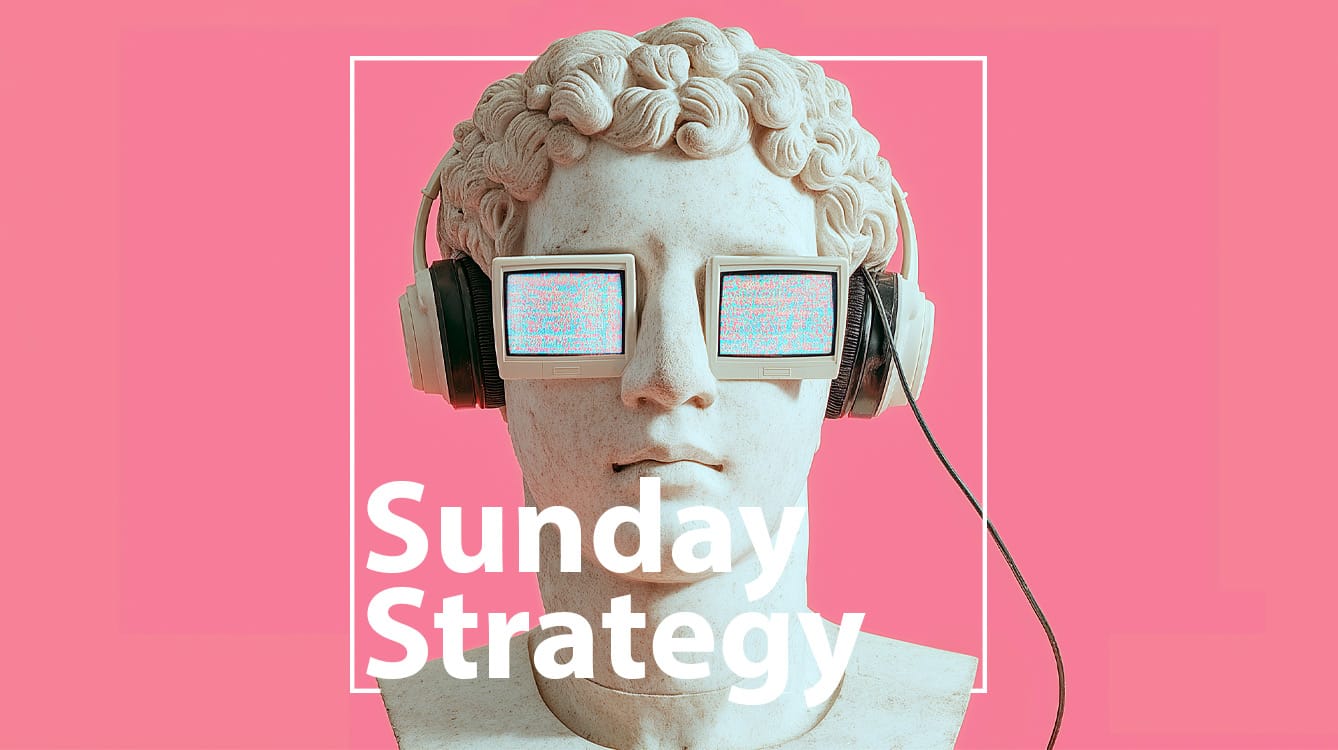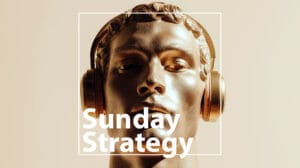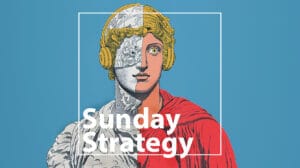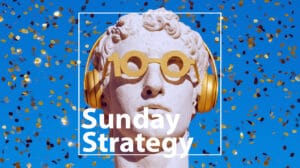In this issue of Sunday Strategy, we look at five stories to think about next week, including: Social Media’s Slip Away from Socializing, Parents on Spring Break, Romantasy Goes Experiential, AI Geo-Guessing and EV’s Existential Crisis.
In addition, we have ads from: ESPN, DoorDash, BackMarket, KFC and IKEA. If you’d rather listen along, check out this week’s podcast where we discuss these stories below:
// Five Stories of the Week:
1.) When Social Media Loses Its Social Side
As Meta’s antitrust trial kicked off this week, slides used in its opening statement confirmed something we’ve known for a while – that social networks are much less ‘social’ and much more ‘interest’ based. Data shared by the network shows that users spend 17% of time viewing content shared by friends on Facebook and 7% on Instagram. Additionally, data shared shows 55% of time on Facebook is spent consuming video content – which Meta argues is evidence that networking with friends has moved to messaging. This shift, it argues, makes its core platforms video platforms and positions YouTube and TikTok, famously video led, as its biggest competitors.
Meta’s filings are just one more signal in the shift away from a ‘social-graph’ to an interest-graph. This shift has seen social media personality Gary Vaynerchuk highlight the ability of singular videos or replies to succeed in social vs. relying on followers. A shift from engagement and content distribution over follower count, naturally changes how we see ‘social’ networks and how we may judge new entrants.
Rumours that OpenAI is considering a social network make less sense in a social and connection based world, where network effects and existing friend connections are hard to replicate – but makes more sense when we consider networks as content distribution channels beyond our friends. AI’s ability to suss out our interests, curate and connect us with content over people may give it an interesting opportunity. When social networking is about connecting with people’s content, over people, new opportunities emerge.
2.) What Happens When Parents Go On Spring Break?
American parents are increasingly tagging along on their high-school senior’s spring break trips. As 18 year olds head off to their ‘first’ spring break, often in countries where 18 is the drinking age, the tradition has seen parents tag along to support.
The move, while most likely logistical and safety related, does highlight the changing nature of parenthood for many; where parents want to give children freedom balanced with a safety net. A generation of parents who grew up on MTV’s Spring Break may be trying to give their kids a taste of the pre-social media hedonism they had, while not going too lit. I had to stop after that joke to make sure MTV’s ‘Dan Cortese’ is still alive and well…he is.
So is this trend an example of helicopter parenting? Or pragmatic permissiveness amongst those families wealthy enough to send children abroad for the occasion?
3.) Real World Romantasy.
TikTok’s Booktok community of romance and fantasy (‘romantasy’ to some) fiction lovers have already had their impact felt in book sales, so much so that the social network has gone into publishing. However, beyond the books themselves, the subculture has created a burgeoning industry of real world events, featuring actors and cosplayers from series like ‘A Court of Thorns and Roses’.
These fantasy balls, where tickets can be between $100 and $400 aren’t far from other immersive events like Secret Cinema’s ‘Bridgerton’ or ‘Dirty Dancing’ events, but the performers show a knowledge and reverence of the source material. ‘Book Boyfriends’ and ‘Shadow Daddies’ are keenly aware of the investment required in costumes and dancing skills to succeed and the feedback loop created by social media content from events. Like all subcultures, IRL events are the natural conclusion to online networks and interest sharing, but the romantic escapism offered by these events feels particularly powerful in uncertain times.
4.) From Action Figures to Geo-Guessing.
Last week was action figures, this week is geo guessing as AI users continue to swap functional bandwagons. At this point, cultural fads are doing functional marketing for ChatGPT and others, but how long will we all make the same things? The continued fads around what to create with AI could speak to limited user imagination or a sense of social proofing whatever we share as we figure the technology out.
Either way, are we poised to keep on following each other’s lead, or can we take the infinite potential of AI in new, uniquely personal directions?
5.) Without Tesla, Who’s Championing Electric Vehicles?
Without Tesla, EVslook to be facing a perception crisis, even with increasing environmental worry. Two recent polls from Gallup showed an interesting trend for EVs in the US. An April 17th Gallup poll showed that 65% of Americans believe the environment is fair or poor and 62% believe it’s getting worse.
In the past, increasing environmental concern would be an opportunity for electric vehicles to overcome range or cost anxiety and position themselves as a solution. However, Elon Musk and Tesla’s recent popularity dive may have left the sector without a mascot.
An April 7th poll shows that consideration and ownership of EVs by Americans has decreased since 2023, down 8%. Environmental and EV attitudes break on party lines (71% of Democrats would consider or own one vs. 31% of Republicans), however both groups are more likely to consider a hybrid (55% of Republicans would own / consider a hybrid vs. 77% of Democrats.
The challenge is wider than Tesla and Elon Musk’s popularity nosedive – but without someone pushing consumers further into EVs, are we more likely to see consumers across the US settle on a hybrid instead? With lower upfront costs on average, it may be the easier solution – leaving EVs without a compelling argument for the moment.
// Ads You Might Have Missed:
1.) ‘Stanley Cup Chirpline’ – ESPN:
Do you miss the way trash talk used to be? The NHL Stanley Cup Playoffs are upon us and to celebrate, ESPN has taken a decidedly 90s approach. The broadcaster has launched the ‘Stanley Cup Chirpline’, an old school sports hotline you can call to share your hot takes, team put downs and playoff grievances. The ad promoting it takes a decidedly nostalgic approach, from VHS quality footage to phrases that will evoke memories in any 90s child about ‘getting their parents permission’. The Chirpline harkens back to a more human time for sports arguments and creates a content factory for ESPN throughout the playoffs – with the best calls being used on air and in social media.
2.) ‘Dog Friendly’ – DoorDash:
DoorDash’s latest ads are simple, intelligent work that taps into something dog owners know – though my dog Queso would never agree to sit outside. Moving from the UK to the US with a dog, I was amazed how much more dog friendly UK pubs were than US bars and cafes. I know not everyone wants to eat or even drink with dogs around them, but DoorDash’s recent ads for ‘National Dog Day’ tap into that sense of wishing your dog could come along too. The video and accompanying photos don’t emphasize the point too heavily, if only because the insight into dog ownership does a lot of the talking.
3.) ‘How Many Upgrades Do We Have Left?’ – Back Market:
We’re so focused on moving forward technologically, we may be missing how we’re moving back ecologically. Technological comparison ads are adept at showing up how we’ve progressed, but what if they showed us what we’re losing? Refurbished device marketplace Back Market’s latest campaign builds on previous efforts to hijack big tech’s language and promotional mechanics, to show the full cost of innovation. The ads, launching over the next month, feature images showing the same places through different iterations of technology – while subtly highlighting the environmental damage. From a glacier captured on an iPhone 3GS to a melting river shown on an iPhone 16, the campaign subverts the constant pace of innovation into a countdown timer to disaster.
4.) ‘First Steps’ – IKEA:
Furniture can be more than an object, it’s a background or even a supporter for different life moments. IKEA has extended the ‘Wonderful Everyday’ thinking behind its brand to a UAE ad which celebrates furniture’s role in the first steps of babies across the country. The wonderfully simple ad shows different products and prices as they’re used as support by new toddlers and in the process, it sells while reminding people about furniture’s role in making a home.
5.) ‘Handmade Billboards’ – KFC:
78% of French customers didn’t know KFC handmakes its chicken tenders on site. To demonstrate its dedication to hand making things, its latest campaign in France features 73 handmade OOH billboards, created by a KFC team member with a red marker. It is another example of how authenticity and craft is finding a role in increasingly artificial and polished advertising – though taking a decidedly simpler approach than another craft focused ad this week from Britbox in the UK (which filmed 14 hours of footage in a single shot).
// Sunday Snippets
// Marketing & Advertising //
// Paul Rudd reprises his role in a 1991 Nintendo commercial to promote the launch of the Nintendo Switch 2 [Gaming]
// IAMs uses Generative AI to help create ‘I want a kitten / puppy’ persuasive movies [Ads]
// The agency for nature uses sensors and tech to create a talking tree [Ads]
// Corona pays tribute to the power of the Sun with ‘Impossible Plants’ in Japan [Ads]
// Chili’s offers ‘fast food financing’ in pop-up store next to McDonald’s [Ads]
// FIFA releases all the posters for each location of the 2026 World Cup [Sports]
// On Running’s latest campaign takes Zendaya to space [Ads]
// Out amongst the ‘pot heads’ at Le Creuchella [Brands]
// Miller High-life released a beer infused vinyl record [Marketing]
// Domino’s have launched a garlic and herb dip flavoured Easter Egg. Their scientists were so focused on if they could do it, they never stopped to think if they should. [Food]
// Surreal tease a partnership with LoveHoney in the UK to show how ‘adult’ their cereal can be. [Collabs]
// Technology & Media //
// Notorious message board 4Chan has been hacked and data has been leaked [Media]
// Jimmy Fallon hosts a new reality show taking on advertising [Media]
// Are we on the verge of a universal allergy cure? [Health]
// The Windows 95 startup sound will be stored in the US Library of Congress [Media]
// Candi-noir? Canadians watch more true-crime content than any other country on Netflix [Media]
// Black Mirror Season 7’s fictional game ‘Thronglets’ is a real thing now [Gaming]
// TikTok users are championing the benefits of ‘adult tummy time’. I swear its SFW [Social Media]
// New research shows Gen AI usage has shifted towards admin and therapy in the last year [AI]
// The rise of the infinite fringe in the conspiratorial internet [Social Media]
// Nike and Hyperice release a ‘recovery boot’ [Fashion]
// Strava acquires upstart running app Runna [Sports]
// Life & Culture //
// Are you broke or is it just, as the NYT says, ‘Money Dysmorphia’? Can’t it be both? [Finance]
// A new study shows Americans of all income levels die earlier than their European counterparts [Health]
// Shangri-la, the famous after hours area of UK festival Glastonbury announces a shift in this year’s creative direction, towards ‘The Wilding’ [Music]
// ‘American Psycho’s director is baffled by the Sigma Male adoration of the film [Film]
// Do we need a better definition of ‘classical music’ [Music]
// The rise of the ‘middle skill’ job [Work]
// Rob Mayhew is aiming to fix younger generations of marketers missing the traditional ‘Friday’ work experience with a new YouTube series [Work]
// Young Chinese are considering hotels over renting for accommodation [Culture]
// America’s new obsession is protein [Food]
// Situationships have given way to ‘explorationships’ in dating [Romance]
// Until Next Sunday
As always, let me know what you think by email (dubose@newclassic.agency), website or on LinkedIn.
You can also listen to an audio summary and discussion of each week’s newsletter on Spotify. We’re also on TikTok!





